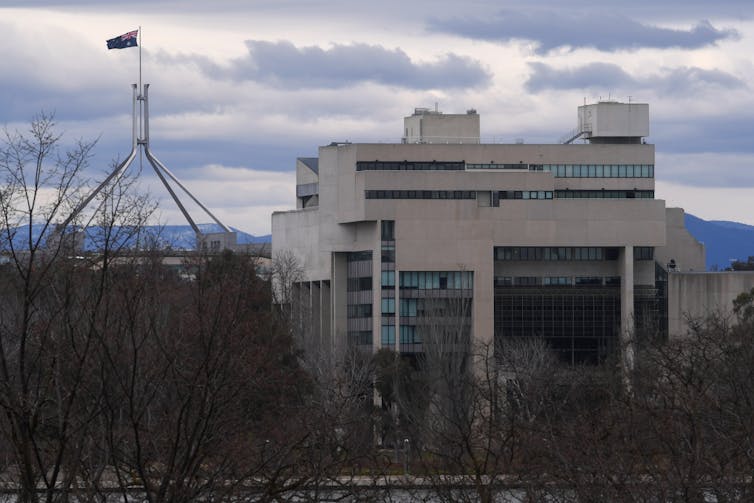Federal parliament just weakened political donations laws while you weren't watching
- Written by The Conversation
While Australians were distracted last week by Melbourne’s lockdown ending and the final days of the Queensland[1] and United States elections[2], both major parties joined forces in federal parliament to weaken political donations laws.
This will make it easier for federal politicians to accept secret donations from property developers.
What’s the backstory?
In 2019, the High Court upheld[3] Queensland laws banning property developers[4] from making donations to political parties. The ban was introduced by the Palaszczuk government after a recommendation[5] by the state’s Crime and Corruption Commission.
The Queensland ban applies to donations made to state and local political campaigns as well as general donations to political parties. A general donation might be used for federal, state or local political purposes or for the costs of running a party.
Read more: Fundraising questions have interrupted the Queensland LNP's election campaign. What does the law say?[6]
At the same time, the High Court also struck down a 2018 federal law[7] that said property developers could ignore state laws banning them from making general donations to political parties. (Yes — federal parliament really did pass a law overriding state anti-corruption[8]powers!). The High Court said federal parliament has no power to regulate political donations that merely “might be” used for federal campaigns.
Property developers are also banned from making political donations in New South Wales[9] and the ACT[10].
Allowing secret donations from dodgy donors
The legislation[11] passed last week overrides state bans on property developer donations in two ways.
First, the legislation introduces a new provision to replace the 2018 federal law struck down by the High Court. This new provision allows property developers (and others banned from making donations under state laws) to ignore state laws banning them from making political donation where the donation is “for federal purposes”.
 The High Court struck down a federal law on donations in 2019.
Lukas Coch/AAP
The High Court struck down a federal law on donations in 2019.
Lukas Coch/AAP
Second, the legislation allows property developers and political parties to ignore state laws requiring that donations be disclosed. In NSW and Queensland, donations of $1,000 or more[12] need to be disclosed. Under the new federal law, only donations of $14,300 or more[13] made by property developers “for federal purposes” need to be disclosed.
The explanation given for the new laws is that state laws shouldn’t apply to federal donations.
According to Finance Minister Mathias Cormann, the new laws “better clarify” the interaction between federal and state electoral laws.
The revised provisions ensure that federal law only applies exclusively to donations that are expressly for federal purposes, while fully respecting the application of state laws to amounts used for state purposes.
Labor’s Don Farrell, who is shadow Special Minister of State, told the Senate,
it’s not Labor’s intention in any way to weaken any of those provisions already in place in the states, but the Commonwealth parliament should be able to make laws with respect to Commonwealth elections, and those laws should not be overridden by the states.
Why this is bad for integrity
If you are a property developer wanting to curry favour with the NSW Labor Party or the Queensland Liberal National Party, you are now allowed to make a donation of $14,299 and no one will ever know. All you need to do is tell the party the money is “for federal purposes”.
While the law requires parties to keep money donated “for federal purposes” in separate bank accounts, a donation “for federal purposes” frees up money from other, general donations to be used for state purposes.
The Greens[14] and independent MPs lined up to criticise[15] the new law. As member for Indi, Helen Haines told parliament
this bill locks in the status quo when it comes to the current political donations culture at the federal level.
Meanwhile, Tasmanian lower house MP Andrew Wilkie described[16] the law as allowing “brazen money laundering”. Senator Jacqui Lambie said[17] the law was “a doozy” of a way “to hide big donor money from the voters” and “the latest in a long line of betrayals of the public’s trust”.
Federal integrity laws are too weak
Federal parliament had an opportunity to introduce better federal political transparency measures. They could have lowered[18] the federal donations disclosure threshold so the public knows where federal politicians get their money. They could have introduced real-time reporting[19] of donations so the public doesn’t have to wait until after each election to find out the identities of the biggest donors.
Labor has introduced bills[20] on both these measures. Instead of dealing with those, both major parties took the time and effort to override state anti-corruption laws.
To add icing on top, the Morrison government has now released a draft bill for a federal integrity commission[21] with proposed powers so much weaker than existing state anti-corruption commissions that a former judge called it a “feather duster[22]”.
Australians deserve much better than this.
Read more: Explainer: what is the proposed Commonwealth Integrity Commission and how would it work?[23]
References
- ^ Queensland (theconversation.com)
- ^ United States elections (theconversation.com)
- ^ upheld (www8.austlii.edu.au)
- ^ banning property developers (www.ecq.qld.gov.au)
- ^ recommendation (www.brisbanetimes.com.au)
- ^ Fundraising questions have interrupted the Queensland LNP's election campaign. What does the law say? (theconversation.com)
- ^ 2018 federal law (www.theguardian.com)
- ^ overriding state anti-corruption (www.theguardian.com)
- ^ New South Wales (www.elections.nsw.gov.au)
- ^ ACT (www.cmtedd.act.gov.au)
- ^ legislation (www.aph.gov.au)
- ^ $1,000 or more (www.aph.gov.au)
- ^ $14,300 or more (www.aec.gov.au)
- ^ Greens (www.theguardian.com)
- ^ lined up to criticise (parlinfo.aph.gov.au)
- ^ described (twitter.com)
- ^ said (www.lambienetwork.com.au)
- ^ lowered (www.canberratimes.com.au)
- ^ real-time reporting (thenewdaily.com.au)
- ^ introduced bills (parlinfo.aph.gov.au)
- ^ federal integrity commission (theconversation.com)
- ^ feather duster (www.theage.com.au)
- ^ Explainer: what is the proposed Commonwealth Integrity Commission and how would it work? (theconversation.com)

















